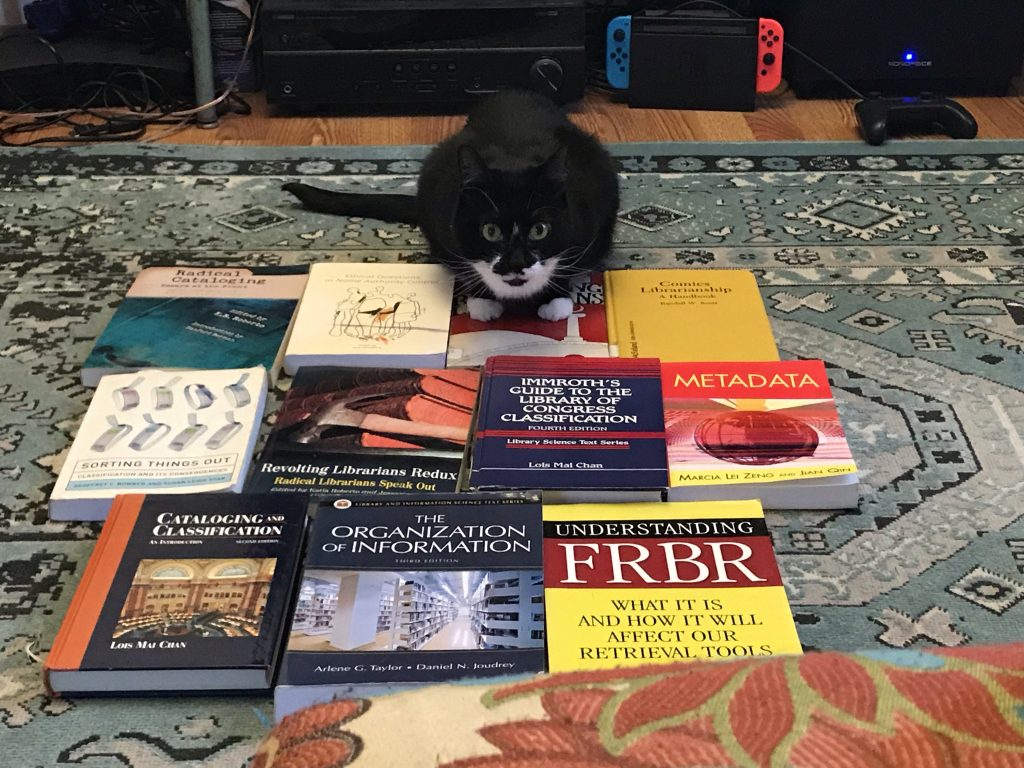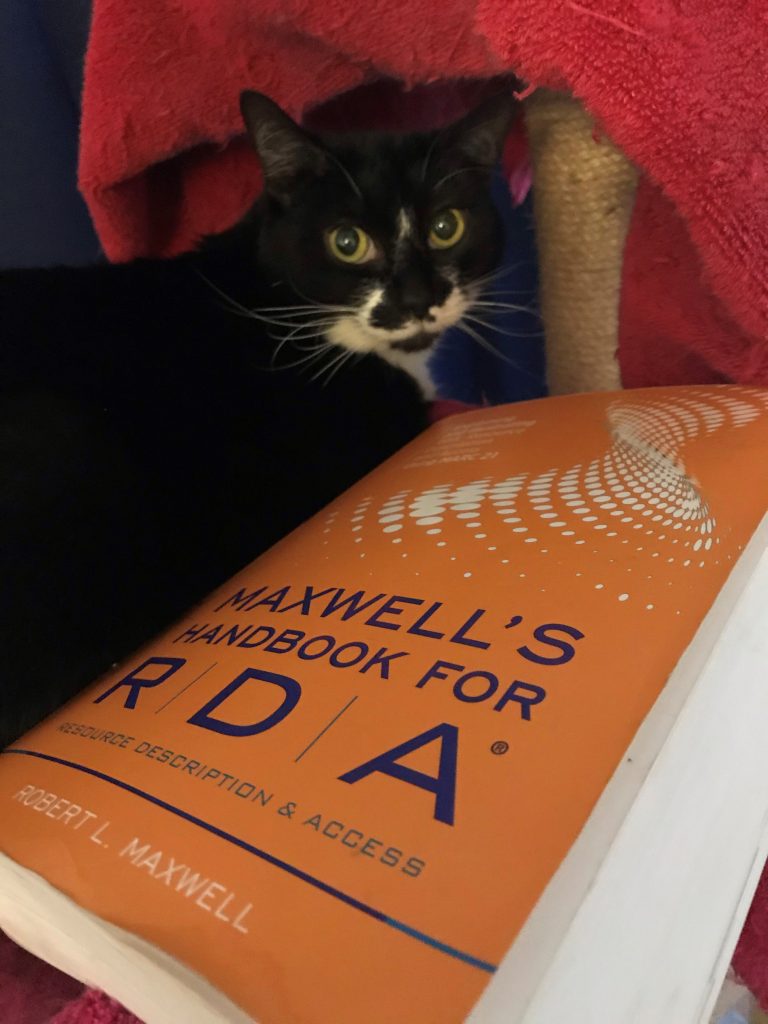Perspectives, an interview series that will highlight the work of librarians in different fields and professional specializations. Our series will focus on the experiences of our participants, what they do, what they have learned, and offer advice to those interested in librarianship and various fields. To our readers, our committee hopes this column will highlight the valuable labor these individuals perform on an everyday basis. Our interviews will provide perspective on what labor in these fields entails and current issues that affect librarianship, employment, etc. On behalf of the Communications Committee, we hope you find this new column illuminating, informative, and inspiring!

What aspects of your job do you enjoy the most?
I became interested in cataloging as a student employee working in my college library. It’s what motivated me to apply to library school, and I’m very fortunate to now have a job as a full-time cataloger. I enjoy taking a wide variety of resources and creating the data which will help future patrons find them for whatever their needs are, research, pleasure, hate-reading, anything they might need. I especially enjoy working with self-published materials because they often represent a unique topic, something personal to the author that perhaps couldn’t have found a home in a traditional publishing environment, but nevertheless it has found its way onto my desk. Working on self-pubs can feel more significant, because the resource is unlikely to be found in many libraries, and so my record might be the only one ever created, it feels like boutique cataloging!
Can you describe a memorable moment in your career?
One of the proudest moments in my career came when a colleague and I proposed headings for Asexuality and Asexual people as Library of Congress Subject Headings (LCSH). The proposals were not initially accepted during the first evaluation but returned to us for further work. We solicited some assistance from additional colleagues and working together, edited and adjusted the proposals and they were approved at their next evaluation. This collaboration and our frequent discussions of it have led to additional projects and a wider understanding that the vocabularies we use in libraries are not static but can [and must] be updated, edited, added to, and improved by community input.
What kinds of professional development do you do?
In terms of professional development — the most upfront is my various ALA responsibilities. I’m currently serving on several different committees/task forces/working groups and have rotated off others. I’m probably proudest in my professional development of being the sponsor of the Lois Mai Chan Professional Development grant. It’s awarded each year to a cataloger/metadata professional from an underrepresented group. Perhaps less obvious as professional development is: Twitter! I participate in what people affectionately call ‘Cataloging Twitter’. The small but active community there loves to chat cataloging, discuss issues and idiosyncrasies, and most importantly help out anyone from ‘Library Twitter’ who needs assistance in understanding a cataloging rule/principle. There’s even a hashtag people use #AskACataloger [coined by cataloger extraordinaire Violet Fox] when they need help from a cataloger.
Is there one piece of advice you have received in your career thus far that stands out the most (that you carry with you in your work)?
Something I carry forward with me is advice from my cataloging professor, Daniel Joudrey: “if you aren’t sure, look it up–and if you are sure, look it up anyway”. Considering the nature of our field, that might sound like needless advice, but then would we account for the landscape of errors that live on in our bibliographic databases? I look things up: instructions, examples, codes, ISBD punctuation, etc. all the time. The sphere of all things a cataloger might need to know is enormous and relying on the notoriously unreliable human memory and hubris of the same is a mistake. It forces me to slow down, think more carefully, and apply instructions more consistently. It also reminds me to check any burgeoning ego, that having something memorized doesn’t make one a more diligent or ‘better’ cataloger.
What are some things you know now about your job/librarianship, that you wish you had known before entering the field?
One thing I’ve been learning as I move through my career that I wasn’t fully prepared for before I embarked on my librarianship path, is change. In my head, I think I imagined that the field I’d been interacting with as a patron my whole life, from my small childhood public library, my school libraries, my much larger city public library, and then college libraries — I assumed that libraries had pretty well figured out how cataloging works, and once I learned the rules and procedures, I’d slot into the well-established routines and practices that all libraries were using. Imagine my surprise when my grad school program explained that a new standard for cataloging [RDA] had just recently been adopted and people were still adjusting to it. Now, five years into my career, there’s a completely new RDA toolkit being released and the cataloging community is trying to figure out how to apply and interpret this new set of rules and codes. This isn’t a field where one can expect permanent constancy, in our attempts to stay relevant and useful, to adapt to new media and new avenues of connecting patrons to resources, we must be prepared for change.
What do you think some misconceptions about librarians/libraries/librarianship are?
I think the biggest misconception about libraries/librarianship is the concept of neutrality. That is, that neutrality ought to be a goal or is even possible. The entire concept of the modern library, that holds up knowledge and curiosity as positive traits to be engaged and nurtured, is not a neutral idea. Lending books, dvds, cds, in some places cookware, and power tools, at no cost to the patron at point of sale, is an extremely non-neutral idea. It supposes that there’s value in the collective paying a bit of money in taxes so that the community as a whole can benefit from shared resources. So despite these baseline values being baked into the core of librarianship, there are still so many libraries that seem to think that, in the name of neutrality, they need to host white supremacists or anti-trans groups. We have limited budgets and therefore have to make decisions on what resources to purchase and what not to purchase, so to do we have limited space in our libraries and have to decide what groups to host and who not to host. Abdicating that responsibility under the pretense of neutrality doesn’t let us off the hook when our patrons feel threatened by knowing we’re a place that is welcoming to hate groups. To claim neutrality in the face of hate is to side with the hate.
What are some current professional obstacles in this field that upcoming professionals should know about?
Current professional obstacles include a shrinking of technical services departments. Some libraries are leaving all cataloging to shelf-ready, vendor-supplied records, and some are eliminating individual positions and requiring employees to perform the functions of many different departments, losing some of the cataloging-specific expertise. You will soon grow tired of people hearing that you’re a librarian and making the same four jokes over and over again. Kidding aside, there are genuine pockets of people you’ll encounter who do not see any value in libraries, or think of them as a dying relic from a different era — you’ll have to learn how to respond to that. Another professional obstacle is cost. Library schools can be expensive and student debt is a monstrous crisis. Until such time as all student debt is wiped out [as it should], you definitely want to do your research before deciding where to attend.
What professional advice would you give to graduate students who are about to enter this line of work?
The professional advice I’d give is this: read widely, and listen well. Library school is usually only 2 years. That’s barely enough time to learn the practical skills you need to be able to perform your desired library job, so you’re going to have to supplement the material on your own. Not just during your education, but well beyond. Interrogate what biases and assumptions you’re bringing with you into the profession, and be aware of them. Read about the field, about the work, about working with patrons. Read about the community you plan to serve, read things they write themselves. Listen to people when they’re trying to speak about how libraries can better help them, about how libraries haven’t always been the havens you may have imagined. Listen to people unlike yourself, who’s experiences in libraries don’t match your own. Listen to people who work in different departments in the library, because the whole library only works when we work together.

